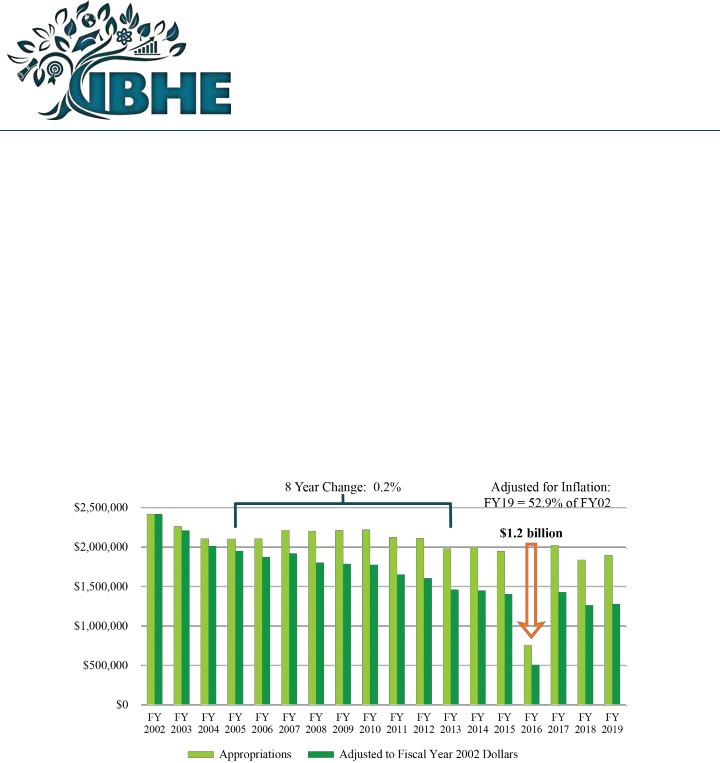
News
from the ILLINOIS BOARD OF HIGHER EDUCATION
Contact: Melissa Hahn | 217.557.7354 | 217.441.1066 cell | hahn@ibhe.org
Dec. 5, 2018
IBHE BOARD APPROVES HIGHER EDUCATION BUDGET REQUEST
JOLIET – The Illinois Board of Higher Education has approved a fiscal year 2020 budget that would include $314 million new dollars, or a 16.6 percent increase in funding, for higher education operations in Illinois. “This next fiscal year is beyond critical for the future of higher education in our state,” said Tom Cross, chairman, IBHE. “The board believes that a $2.208 billion budget request will mean reinvestment in higher education, and a commitment to ending the pattern of outmigration of Illinois students.” The board action was taken Tues, Dec. 4.
Illinois Higher Education Appropriations Operation History
Adjusted for Mandates and Inflation
“For the public universities, we feel that a ten percent increase, or $110 million in additional revenue, is reasonable and will allow those institutions to start to heal after 16 years of budgets below the benchmark of fiscal year 2002,” explained Cross. “Universities still haven’t come close to recovering from the worst blow, which was the stopgap budget of fiscal 2016.” The chart above shows the appropriations for higher education as adjusted for unfunded mandates and inflation.
In the budget request, IBHE is asking for additional money for grant programs. IBHE Executive Director Dr. Al Bowman said, “If Illinois wants more of its high school graduates to attend Illinois colleges and universities, an important incentive is the availability of grants. This budget request will go a long way toward keeping more students here.”
The new or increased grant lines include: |
|
|
∙ Monetary Award Program (MAP) |
$100 million |
|
∙ |
AIM HIGH |
$20 million |
∙ Veterans and National Guard |
$26 million |
|
∙ |
Assistance for Nonpublic Institutions |
$25 million |
“It’s important to note that even with a 16.6 percent increase, next year’s budget would still be lower than the $2.417 billion amount approved by lawmakers for fiscal year 2002,” said Cross.
Bowman told the board that there is a clear connection between tuition increases and the woefully inadequate budgets for higher education. “Revenues for public universities used to come primarily from the state budget, at 72 percent of the total in fiscal 2002. That meant that only 28 percent came from tuition and fees. That ratio has flipped, so that students are largely responsible for almost 65 percent of university revenue.”
Trends in Educational and Related Revenues at Illinois Public Universities
The board is also requesting $664 million in Capital Renewal funding to pay for imperative deferred maintenance. That is in addition to $1.5 billion that is necessary for regular capital projects.
# # #